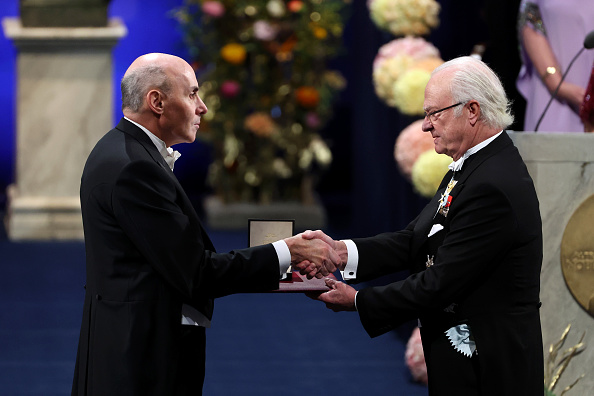mRNA success was not overnight, but took 20 years of work, overcoming many failures
 Photo by Pascal Le Segretain/Getty Images
Photo by Pascal Le Segretain/Getty Images
Messenger RNA (mRNA) is a vehicle into the body, transporting a blueprint of how we can develop an immune defense against a virus or other disease. In the case of COVID-19, the modified mRNA technology pioneered by Drew Weissman, MD/PhD’87, Hon.’23, and his longtime research collaborator biochemist Katalin Kariko, PhD, made mRNA both safe and effective and was used in both the Pfizer and Moderna COVID-19 vaccines that helped end the pandemic.
It was Kariko who called Weissman in the early morning hours to notify him they had jointly won the 2023 Nobel Prize in Physiology or Medicine, joining 224 other Nobel Prize laureates in that category chosen since 1901. Weissman was the ninth in a list of BU alumni and faculty Nobel laureates. Most recently, the late Osamu Shimomura, PhD, Hon.’10, then an adjunct professor at BU’s medical school, shared the 2008 Nobel Prize in Chemistry.
Weissman is the Roberts Family Professor of Vaccine Research at the University of Pennsylvania Perelman School of Medicine, and Karikó is an adjunct professor of neurosurgery at Perelman and a senior vice president at BioNTech, a global next generation immunotherapy company. The pair received the country’s top biomedical research prize, the Lasker-DeBakey Clinical Medical Research Award, in 2021 as well as the 2020 Lewis S. Rosenstiel Award, given by Brandeis University and the Rosenstiel Foundation, and Columbia University’s 2021 Louisa Gross Horwitz Prize.
In interviews, Weissman said the mRNA success was not overnight, but took 20 years of work, overcoming many failures.
“There were a lot of down times, a lot of soul-searching, a lot of figuring out why things weren’t working. But we never lost hope because we both saw the incredible potential that mRNA had,” Weissman told BU’s Bostonia magazine in 2020.
mRNA vaccines hold the promise of rapid development times, lower costs and easier modification to adapt as a virus changes. Weissman believes the technology can be used against a wide range of diseases from viruses like tuberculosis, influenza and HIV to allergies, cystic fibrosis, cancer, even heart attack and stroke.
Learn more